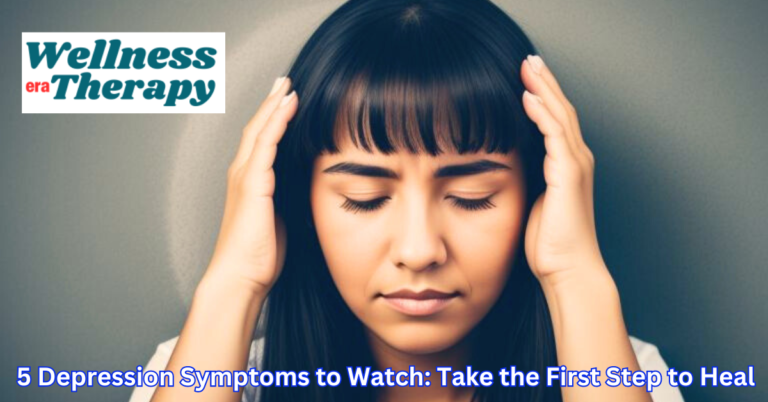Depression is more than just feeling sad or having a bad day. It’s a persistent mental health condition that affects millions worldwide. Recognizing the early signs can be crucial in taking the first steps toward healing. In this post, we’ll explore five key symptoms of depression that you should be aware of. Understanding these symptoms can empower you to seek help or support someone you care about.
Audience
This guide is designed for anyone who might be experiencing symptoms of depression, as well as friends, family members, and caregivers who want to support someone struggling with this condition. Whether you’re directly affected or are concerned about a loved one, this blog will provide valuable insights.

1. Persistent Sadness or Low Mood
One of the most common symptoms of depression is a persistent feeling of sadness or low mood. This isn’t just an occasional bad day; it’s a pervasive feeling that doesn’t seem to go away. People with depression may feel hopeless, empty, or numb, which can significantly affect their daily life.
2. Loss of Interest in Activities
Depression often leads to a loss of interest in activities that once brought joy. Whether it’s a favorite hobby, spending time with friends, or even enjoying a good meal, nothing seems to bring pleasure anymore. This loss of interest is known as anhedonia and is a key indicator of depression.
3. Changes in Sleep Patterns
Sleep disturbances are another hallmark of depression. Some people may experience insomnia, struggling to fall or stay asleep, while others may find themselves sleeping excessively. Neither extreme is healthy, and these changes in sleep patterns can exacerbate other symptoms of depression.
4. Fatigue and Low Energy
Chronic fatigue or a lack of energy is a common symptom of depression. Even simple tasks can feel overwhelming, and the motivation to do anything can be nearly nonexistent. This fatigue isn’t just physical; it’s mental and emotional, making it even harder to push through the day.
5. Difficulty Concentrating
People with depression often experience difficulty concentrating, making it hard to focus on tasks at work, school, or home. This symptom can lead to frustration and exacerbate feelings of inadequacy or guilt, further deepening the depressive state.
Conclusion
Recognizing these symptoms is the first step toward healing. If you or someone you know is experiencing any of these signs, it’s essential to seek professional help. Depression is treatable, and early intervention can make a significant difference. Remember, taking that first step, whether it’s reaching out to a friend or consulting a mental health professional, is a crucial part of the journey to recovery.
Call to Action: If you or someone you know is struggling with depression, don’t wait. Seek help today and take the first step towards healing.
FAQ
What are the early warning signs of depression?
Early signs of depression include persistent sadness, loss of interest in activities, changes in sleep patterns, and difficulty concentrating. Recognizing these symptoms early can help in seeking timely treatment.
How can I help someone showing symptoms of depression?
If someone you know is showing symptoms of depression, offer your support by listening, encouraging them to seek professional help, and being patient as they navigate their journey to recovery.
Is it possible to recover from depression by recognizing symptoms early?
Yes, early recognition of depression symptoms can lead to more effective treatment. Seeking help at the first sign of symptoms can significantly improve the chances of recovery.



1 Comment
Pingback: মানসিক চাপ কিভাবে ডিপ্রেশন সৃষ্টি করে